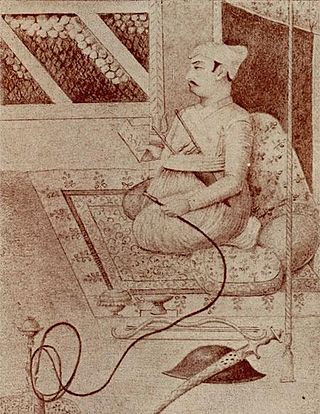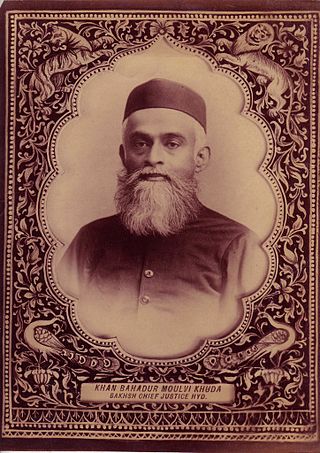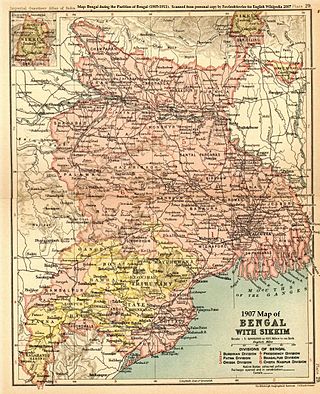Related Research Articles

Sir Syed Ahmad Khan, also spelled Sayyid Ahmad Khan, was an Indian Muslim reformer, philosopher, and educationist in nineteenth-century British India.

Sayyid is an honorific title of Hasanids and Husaynids Muslims, recognized as descendants of the Islamic prophet's companion, Ali through his grandsons, Hasan and Husayn.

The Sultanate of Golconda was an early modern kingdom in southern India, ruled by the Persianate, Shia Islamic Qutb Shahi dynasty of Turkoman origin. After the decline of the Bahmani Sultanate, the Sultanate of Golconda was established in 1518 by Quli Qutb Shah, as one of the five Deccan sultanates.

Mir Qasim was the Nawab of Bengal from 1760 to 1763. He was installed as Nawab with the support of the British East India Company, replacing Mir Jafar, his father-in-law, who had himself been supported earlier by the East India Company after his role in winning the Battle of Plassey for the British. However, Mir Jafar eventually ran into disputes with the East India Company and attempted to form an alliance with the Dutch East India Company instead. The British eventually defeated the Dutch at Chinsura and overthrew Mir Jafar, replacing him with Mir Qasim. Qasim too later fell out with the British and fought against them at Buxar. His defeat has been suggested as a key reason in the British becoming the dominant power in large parts of North and East India.
Koath is a notified area in Rohtas district in the Indian state of Bihar.

Khuda Bakhsh Oriental Library is one of the national libraries of India, located in Patna, Bihar. It was opened to public on 29 October 1891 by Khan Bahadur Khuda Bakhsh with 4,000 manuscripts, of which he inherited 1,400 from his father Maulvi Mohammed Bakhsh. It is an autonomous organization under Ministry of Culture, Government of India, and is governed by a Board with the Governor of Bihar as its ex officio Chairman, and is known for its rare collection of Persian and Arabic manuscripts. It also hosts paintings made during the Rajput and Mughal eras of India.
Dr. Shridhar Vasudev Sohoni (1914–2002) was an eminent scholar of Sanskrit, and a noted antiquarian and numismatist. He was an officer in the Indian Civil Service, and later in his career served as the Chief Secretary of Bihar, Lokayukta of Bihar, and the Vice-Chancellor of Lalit Narayan Mithila University and Tilak Maharashtra University. As a scholar, he published extensively and authored and edited several books and essays on a variety of subjects, including archaeology, architecture, Buddhism, literature, music, Sanskrit, sculpture, and administration. Dr. S.V. Sohoni was honoured with many awards and a festscrift recognised him as one of the founders of the Academy of Indian Numismatics and Sigillography. A festschrift celebrating his Sanskrit scholarship had already been published a decade earlier. He was conferred D.Litt. degrees by four institutions, University of Delhi, Vikram University, Lalit Narayan Mithila University, and Nalanda University. Dr. Sohoni was serving on the Regulating Council of the Bhandarkar Oriental Research Institute when he died.

Syed Hasan was an Indian writer, scholar and professor of Persian language and literature from Patna, Bihar. He was a great scholar "steeped into Persian". He headed the Persian Department of Patna University from 1972 to 1978. In 1954–55, he was awarded a scholarship under the Government of India Foreign Languages Scholarships Scheme for Studying in Iran.
Bismil Azimabadi was an Indian freedom fighter, landlord, and an Urdu poet from Patna, the capital of Bihar.

The Subah of Multan was one of the three subahs (provinces) of the Mughal Empire in the Punjab region, alongside Lahore and Delhi subahs. It was also amongst the original twelve Mughal provinces, encompassing southern parts of Punjab, stretching towards parts of the regions of Pashtunistan and Balochistan, bordering Kandahar Province and the Persian Safavid Empire. It was one of the largest and most important provinces of the Mughal Empire.

Sir Khan Bahadur Khuda Bakhsh OIE FRAS was an Indian advocate, judge, philosopher, revolutionary freedom fighter, scholar and historian from Patna, Bihar. He was the founder of Khuda Bakhsh Oriental Library and Chief Justice of Nizam's Supreme Court of Hyderabad from 1895 to 1898. Khuda Bakhsh maintains a strong legacy across the Islamic World for his contributions to Literature and History.

Kharui Raj principality traces its origin nearly three centuries, before the advent of British Raj in India. It was ruled by the descendants of Sayyid dynasty. The clan were practically independent rulers in the period between the collapse of Mughal Empire and the rise of the British Raj. The rulers were the descendants of Hasan ibn Ali, hence they assumed Hassan as their family name.

Shad Azimabadi was an Indian poet and writer from Azimabad, Patna, Bihar.
Shayesta Bedar is an Indian historian, academician and scholar who is currently serving as the Director of Khuda Bakhsh Oriental Public Library, Patna. Before joining the National library, she has served as an Assistant librarian in Maulana Azad Library AMU, Aligarh from (1993–2019) as in-charge of the Manuscript section of the library where she established a library museum in Maulana Azad Library. She has authored numerous research papers based on Persian and Urdu literature. Additionally, she has edited and compile work for a variety of books related to Persian, Hindi and Urdu literature.

The history of Aligarh Muslim University begins with the Aligarh movement, which was a movement to establish a Western style of education for the Muslims of British India. The movement was pioneered by Sir Syed Ahmed Khan, who founded the Muhammadan Anglo Oriental College in Aligarh. Sir Syed retired at Aligarh, and undertook the charge of raising funds for the college, and supervising the construction of the campus.
Fasihuddin Balkhi was an Indian Author and Historian. He belonged to the Bihar-based Khanqah Balkhia Firdausia, Fatuha, Patna. He was a contemporary of Taqi Rahim, Shad Azimabadi and Shah Mohsin Danapuri. He was an active participant in the Non-cooperation Movement. His works include "Tarikh-e-Magadh", "Tazkira-e-Hindu Shora-e-Bihar" and "Wahabi Movement."
Syed Muhammad Jamaluddin Madari popularly known as Janeman Jannati was a disciple of Shah Badiuddin Qutbul Madar and a Sufi saint of Madariyya order of Sufism. He is known as the nephew of Abdul Qadir Jilani and one of four main Khalifa of Shah Badiuddin Qutbul Madar. He was the founder the Dewangan sub-order of Madariyya, who followers use 'Malang' as their surname.
Mukhtaruddin Ahmad Arzoo was an Indian literary critic and Writer of Urdu language. He was former Dean of Faculty of Arts at Aligarh Muslim University. He was appointed as the lecturer in the Department of Arabic at Aligarh Muslim University in 1953. He was the founding Vice Chancellor of Maulana Mazharul Haque Arabic and Persian University. He was appointed as the Senior Fellow at Royal Aal al-Bayt Institute for Islamic Thought, Jordan in 2004.
Adam Sufi (1187–1297), popularly known as Makhdoom Adam Sufi, was an Islamic scholar, preacher and Sufi saint of Chishti order. He was son of Syed Ibrahim Chishti of Hajipur. He was father of Syed Hamiduddin Chishti. He is buried in Pakki Dargah, near Jethuli in Patna, India.
References
- ↑ Choudhary 2001, p. 52.
- ↑ "Professor Syed Hasan Askari | Historian". prof-s-h-askari. Retrieved 13 June 2019.
- ↑ "Eminent Personalities". www.kujhwaonline.in. Retrieved 8 July 2019.
- 1 2 "State forgets first historian". www.telegraphindia.com. Retrieved 8 July 2019.
- ↑ "मध्यकालीन इतिहास की नई खोज का रास्ता तैयार किया प्रो. हसन अस्करी ने". Dainik Bhaskar.
- ↑ "सूफी परंपरा पर प्रो. अस्करी का काम उम्दा". Dainik Bhaskar.
- ↑ "मध्यकालीन इतिहास के मूर्धन्य इतिहासकार थे प्रो. सैयद हसन -". Jagran (in Hindi). Retrieved 7 November 2024.
- ↑ Ridgeon, Lloyd V. J. (February 2008). Sufism: Hermeneutics and doctrines. Routledge. ISBN 9780415426244.
- ↑ Askari. "An Introduction to Twenty Persian Texts on Indo-Persian Music". Humanities Commons.
- ↑ "Select Bibliography: Sufi Literature in South Asia". Sahapedia. Retrieved 8 July 2019.
- ↑ "Khuda Bakhsh Hosts Intl. Conference". www.milligazette.com. Retrieved 8 July 2019.
- 1 2 3 "Professor Syed Hasan Askari I Chronology". prof-s-h-askari. Retrieved 7 November 2024.
- ↑ Choudhary 2001, p. 50.
- ↑ Choudhary 2001, p. 50-51.
- ↑ "Ghalib Institute غالب انسٹی ٹیوٹ: Ghalib Award". Ghalib Institute غالب انسٹی ٹیوٹ. Retrieved 8 July 2019.
- ↑ "Bharat Ratna, Padmavibhushan, Padmashree and other Award winners". www.patnauniversity.ac.in. Archived from the original on 29 May 2019. Retrieved 8 July 2019.
- ↑ Iran: Journal of the British Institute of Persian Studies. The Institute. 1993.
Bibliography
- Choudhary, Bijoy Kumar (2001). Readings in Indian History: Syed Hasan Askari Centenary Volume. Patna: Kashi Prasad Jayaswal Research Institute. pp. 49–52.